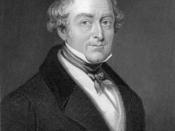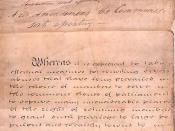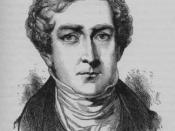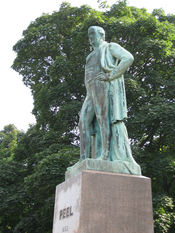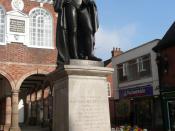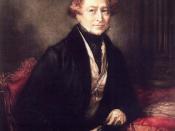Up to see subject Search the EssayLab: Did Peel's statesmanship prevent him from being a good politician? Courtesy of www.Revise.it Sir Robert Peel was not the archetypal Tory landowner, but rather the first middle-class man to make any impact in politics, and so heralded in a new meritocracy, with the wholly elected House of Commons more influential than the Lords or the King, and organised into tight political parties with defined policies and objectives.
This did not happen overnight, of course, nor was Peel perfect or consistent during his career. So it is that certain questions about Peel have emerged, not least of which is whether Peel held more dearly to his personal, party interests, or to those of the Country at large: for while it is difficult to argue that he never followed policies that were harmful to many traditional Tory supporters, and led to resentment among his back benches - he broke the party twice, in 1829 and in 1846 - yet it was he who created the system of strict party allegiances, and so is hailed as the founder of party politics in Britain.
Peel's lineage was one of self-made men, his grand-father a yeoman farmer, his father a mill-owner. Having been brought up with middle-class values and bought a parliamentary seat (Cashall in Ireland, in 1809) by his ambitious father, and by keeping his thick Lancashire accent, he stood out from the midst of the wealthy land-owners that made up the large majority of MPs. Perhaps part of the resentment that was felt towards him by his own back benches was due to this: the middle classes and the "nouveaux riches" were the great enemies of the land-owning upper class, since these industrialists were grabbing the influence and prestige that had always been the aristocracy's and gentlemen farmers'.
Peel, however, found that it was the Tory party, and not the (outwardly) more liberal Whigs, in whose ranks he would have been less conspicuous, which he was drawn to. His policies were said by many in his party to be too progressive and reformist: Disraeli, his harshest critic, said that he had "caught the Whigs bathing, and stolen their clothes". While undoubtedly a great intellectual, administrator and financier, he was no orator, and was never able, or willing, to explain to his party the reasons behind his policies.
He saw the duty of the Tories/Conservatives to be a brake on reformist zeal, and believed in "constructive opposition". "I will not undertake to adopt ...every popular impression of the day" nor "live in a perpetual vortex of agitation", he explained in the 1834 Tamworth Manifesto, but supported change "combining with the firm maintenance of established rights, the correction of proved abuse and the redress of real grievances". "The just and impartial consideration of what is due to all interests - agricultural, manufacturing, and commercial" was his objective. In all of this, Peel the Statesman comes through, one who did not care if he broke his party, so long as the interests of the Nation were served, as happened in 1846 with the repeal of the Corn Laws.
For this apparent disinterest towards party politics, he was hated by some: "a great parliamentary middleman" is how Disraeli described him, when what was needed was "the legitimate influence and salutary check of a constitutional opposition". Peel was not, he argued, a firm leader committed to "the maintenance, defence and continuance of those laws, those institutions, that society, and those habits and manners, which have contributed to and mould and form the character of Englishmen", as Peel himself had claimed, but had changed the Tories into "a party without principles", that would always "bend to the passion or combination of the hour", that would conserve "everything ...that is established, so long as it is a phrase and not a fact".
Peel was neither as strong as he claimed to be nor as weak as he was made out to look. His lack of communication extended to the whole country, not just his own party. His strong and very public opposition to O'Connell and the Irish question, and the Reform Bill of 1832, made the public perceive him as almost reactionary, and gave him the popular nickname Orange Peel. In fact, he was merely trying to cool the ardour of Radicals, and privately he did reform, but in a much slower and typically rational way. In Ireland he opened up many positions of influence to Catholics; his opposition to the Reform Bill was to show to the Radicals and the population that every important change to the constitution had to be weighed up carefully, even though he privately admitted that resistance was "fruitless".
Nevertheless, it was the public Peel that was important. When he put forward Catholic Emancipation, or the repeal of the Corn Laws, it was seen as no less than a total betrayal of his party and its traditional supporters.
An evolution in Peel's policies over the course of his career is evident. Until the publication of the Tamworth Manifesto in 1834, Peel usually made sure he tread the Tory traditional line of church and State in public. Privately, he was a mild reformer, both in Ireland (as chief secretary for Ireland 1812-18) and in financial matters (he hinted at free trade and laissez-faire as chairman of the Bullion Committee 1819). It was only as Home secretary, though, in 1829, that the public first saw that he was not terrified of reform, when he passed the Catholic Emancipation Act (although, admittedly, he had resigned over it earlier). His tough stance on the Great Reform Bill might partially have been influenced by a desire to recapture the confidence of the Tory back benches.
In the Tamworth Manifesto, he declared for the first time: "I have never been the enemy of 'judicious reform'". This came at the same time as his reorganisation of the Tory party into a new Conservative party. The shedding of the old images attached to Toryism, the new, tighter organisation, and the new, moderate ideals proffered by Peel were all designed to attract middle class votes. He saw that there was nowhere for the old, reactionary Tories to go, and that they would be forced to remain in the Conservative party, however grudgingly. Victory at the elections rested on the newly-admitted voters (the electorate had doubled as a result of the Reform Act), and Peel saw this. Perhaps his motivation in politics was not so much the satisfaction of doing what was best for the country, but in doing that which was most likely to give him power.
At least until his government of 1842, then, Peel would be more of a party politician than a statesman, trying to undermine Whig support and beat them at their own game.He believed in "constructive opposition", he said, and indeed he was reluctant to oppose any reform outright. Here was a man who agreed that reforms were necessary, but could implement them better than the Whigs, was the public view of Peel. While the Whigs were splitting and quarreling, he would tinker with the bills put before the House, and make them better.
The weaknesses with this system were twofold. As Disraeli said, it meant being leader of a "party without principles", when its duty should have been to act with "the legitimate influence and salutary check of a constitutional opposition"; also, it alienated the traditional, land-owning Tories, who whilst unwilling to defect or form a new, uninfluential party, would be by 1846 ready to lose power so that they might get rid of this outsider and traitor.
Peel's cunning as an administrator, and so politician, in the period of Conservative opposition was demonstrated in his reorganisation of the flailing Tory party into a solid Conservative institution. With F.R. Bonham, he set up the Carlton club to act as a hub for Conservative ideas and discussion, thus strengthening allegiance and camaraderie in the party, and acting as a party whip. MPs would receive financial backing for their electoral campaigns if they supported Peel's motions. He set up a national system of recruitment at grassroots level, and got party agents to encourage Tory supporters to register for the vote; they also queried election results by arguing over whether or not certain property was worth over ã10. "The battle of the constitution is to be fought at the registries", he said. Peel's 1834 Tamworth national letter was the first such party manifesto. By 1839, the Whigs were clearly a spent force, yet Peel declined to take office, so that two years later, by the time of the election, the Whigs were completely broken.
In power, too, he could well have been more interested in keeping himself and his party in power than improving the state of the nation. All the reforms that he passed in office could well have been designed to attract more middle-class votes, in the knowledge that there was nowhere else for the Ultra Tories to go. Ultimately, his downfall was caused because he underestimated the antipathy these old landed gentry held him in, and to what point they were prepared to sink in order to get rid of him. Indeed, to many, he had stolen the Whigs' clothes - he even used Macaulay's adage "Reform, that you may preserve", to suit his ends! Repeal was a strategic retreat, the sacrifice of the bastion of the Corn Laws in order to keep intact the main stronghold of aristocratic power.
Peel's statesmanship and interest in the Nation was questioned by some. His support for free trade, which neither agricultural interests, nor workers, approved of, was seen as pandering to the middle-class industrialists: All Peel's affinities are towards wealth and capital ...What has he ever done or proposed for the working classes ...Cotton is everything, man nothing. (Lord Ashley) However, the most successful men always have the harshest critics, and Ashley's criticism was perhaps unfair. Peel was a very good economist, and his main preoccupation was that the poor should live in better conditions over the long term. He saw that for this to happen, Britain must first become a cheap country to live in, that could compete in international trade. That way, and not by adopting protectionist policies, would conditions in Britain continue to rise. Twenty years later, there were few politicians who still upheld protectionist policies. In his budgets he strove to streamline taxes, to restore confidence in the Pound, to encourage investment. All these, he believed, would result in a stronger economy, that would in turn transmit profits into higher wages for the poor. As for their working conditions, he passed the Factory Act, the Mines Act, and set up a Health Commission. He was cautious, however, and favoured laissez faire, not least because his own party was so set against any further concessions.
Ireland was the other great problem for Peel's ministry. O'Connell and Peel had distrusted each other ever since the days of Orange Peel, and Peel observed "we have that great standing evil which counterbalances all good, the State of Ireland". Eventually, the Act of Union would have to be repealed, but until then Peel was trying to soothe Irish nationalism with kindness, and help Catholics. His plans to increase grants for Catholic colleges in Ireland, and to help Catholics get positions of influence, was, he believed, a way of ensuring that they could not tear away too violently - the grants would stop, there would no longer be support for Catholics in a country still largely dominated by Protestants.
However, Peel failed to inform his supporters and back benches that his kindness would actually benefit them, ensuring a stable Ireland for the foreseeable future. Of course, outrage erupted, since diehard Tories, and Protestants at large, could see in Peel's actions no less than treason - from him, who had promised that "there shall be an established religion and imperishable faith and that established religion shall maintain the doctrines of the Protestant church". His proposal for an increase in the Maynooth grant, in 1844, showed clearly how deep the divide between the Cabinet and the back benches was becoming.
The repeal of the Corn Laws was the last straw (!) for the party members. The Irish famine of 1845 provided the government with an excuse for "the total and absolute repeal for ever of all duties on all articles of subsistence", but Peel had intended to repeal the Laws before the 1847 election in any case. Again, however, his party were unaware of his intentions, nor could they accept that it was to be done "for the benefit of the country" when all their traditional support came from agricultural interests that would naturally lose out if prices were not maintained: Peel did not inform them that, at the same time, it would woo middle class voters - whom they disliked in any case. Perhaps Peel wished to leave the Ultras on the sidelines on purpose, to boost his chances of capturing more new votes.
the Bill passed in 1846, but only because the opposition supported it, since more than two in three Conservatives opposed it. The government was forced to resign.
Peel wanted to be a statesman: "he is so vain that he wants to figure in history as the settler of all great questions", said Disraeli. This ambition would explain his reorganisation of the Conservative party in the 1830s, when he seemed to be a great party politician. The great ideals of Conservatism he set out then were not truly achievable in power, however, but befitted only a party in opposition - one of Disraeli's greatest dislikes about Peel's Conservatism was indeed the fact that it could only follow.
Nevertheless, whether for his own gratification and a place in history, or truly out of devotion to the Nation, Peel was undoubtedly driven by a desire to serve the interest of the country: he warned in 1842 that "if I exercise power, it shall be upon my conception - perhaps imperfect, perhaps mistaken, but my sincere conception - of public duty". That duty he fulfilled, foregoing the interests of the party he had brought up so painstakingly, so that the interests of the Nation might be served. To a certain extent, the dislike in which he was held by Protectionists and Ultras in his party, was unavoidable, since the interests of the few landed gentry was rarely that of the industrialised nation as a whole.
Peel made matters worse for himself, however, in two ways. First, his pursuit of middle class votes, begun as early as 1834 with the Tamworth Manifesto, exasperated many of his traditional followers. Second, his inability to reconcile his public image and his private ideas, throughout his career, and his disdain towards explaining to his party and the Nation why he was following such-and-such a policy, led him to become isolated from his support: "Peel has committed great and grievous mistakes in omitting to call his friends frequently round together to state his desires and rouse their zeal" (Lord Ashley).
Peel's Lancashire accent and his nouveau riche family background, his cold, rational and cautious mind, his lack of panache, and his drab speeches, never helped his cause, either. "His smile was like the silver plate on a coffin", remarked O'Connell after his death in 1850.
